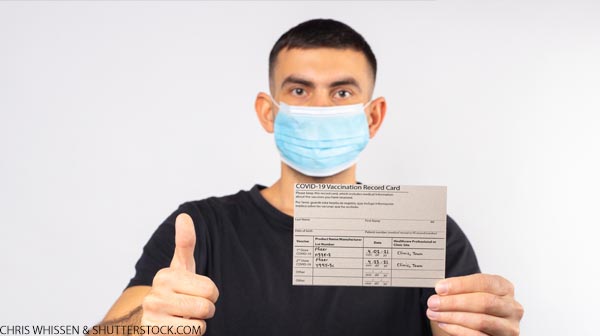
With millions of coronavirus vaccinations being administered each day in the United States, an important question has emerged: Do people need proof of their vaccination status to gain access to public accommodations? In the simplest sense, a platform of standardization is already present. All vaccine recipients in the United States receive a registration card documenting their vaccination status. On the other hand, the cards are easily lost and not easily replaceable. Other countries have developed their own unifying standards. What should be done?
Explore This Issue
ACEP Now: Vol 40 – No 05 – May 2021Vaccine Passports
The concept of vaccine passports as a pathway for restarting stalled and devastated economies is a burgeoning topic among news media outlets.1
There is an expanding list of countries that have announced or formalized vaccine passport systems, including Israel, Greece, Belize, Ecuador and the Galapagos, Georgia, Iceland, Seychelles, and Lebanon, with other countries such as Spain, Sweden, Hungary, Poland, Australia, Saudi Arabia, and Denmark investigating such options, and more are coming.1,2 Two U.S. states, Vermont and Hawaii, have announced vaccine passport plans for visitors, with other states like New York considering such options.
Large numbers of cities and communities in this country are investigating vaccine passport options as a way to restart their tourism and/or local economies. Several airlines and cruise companies have already announced that vaccine documentation will be part of their upcoming boarding scenarios. Smartphone applications are now appearing that tout digital validation of proof of vaccination to avoid counterfeiting of vaccine cards. The European Union, the International Air Transport Association, and China, among others, already have or are proposing COVID passport documentation schemes.1,2
In addition, vaccine promotions are now appearing. For example, a brewery in Cleveland is offering 10-cent beers to the first 2,021 people who show proof of vaccination through its “Beer and the Shot” promo. Uber and Lyft have been providing free and discounted rides to and from vaccine sites. A luxury hotel in Dubai is offering 25 percent discounts to fully vaccinated United Arab Emirates residents. Many economies that have suffered a yearlong battering from the pandemic are coming to view vaccine passports as a route to their salvation.3
Possible Consequences
It is clear that some forms of vaccine passport systems will be with us in the near future. What are some consequences of this? One of the chief consequences is the creation of groups of “haves”—those having received vaccinations—and “have-nots”—those not yet receiving vaccines. If currently accelerating pathways toward utilization of vaccine passport scenarios continue, those without vaccine documentation may find themselves increasingly restricted in the activities they can resume and more subject to the ongoing medical maladies that social distancing has created.1
Will vaccine passports work as intended? Maybe. But there will be significant problems in standardization of any vaccine passport scheme, especially when considering the many different countries and venues. There will arise, as with any other sought-after commodity, persons and groups falsifying data to make a profit or gain access for themselves. All these things will make vaccine passport platforms less functional and create operational difficulties.
If, through ongoing vaccinations and COVID-19 survival, we begin to see a steady decrease in ongoing infections (evolving herd immunity) that leads to COVID-19 fading into the background and either disappearing (like SARS-1) or becoming less pervasive and more seasonal like influenza, then the various COVID-19 vaccine passport scenarios currently being explored may eventually be dropped as being too difficult to operate and manage. In short, if vaccines work well enough and enough people get them, we won’t need passports. We’ll just need vaccines.
However, for the immediate future, there is a real possibility that one or several vaccine passport scenarios will have an impact on all of us, whether we are considering international travel and vacationing or indoor dining at a local restaurant. And we may see, during this immediate future, an evolution of groups of “haves” and “have-nots.” This could cause conflicts, or it could encourage more people to want to get vaccinated. Likely, vaccine passports will cause both.
 Dr. Severance is adjunct assistant professor in the department of medicine at Duke University School of Medicine in Durham, North Carolina, and attending physician in the division of hyperbaric medicine, department of emergency medicine at Erlanger Baroness Medical Center/Erlanger Health System and UT College of Medicine/UT Health Science Center in Chattanooga, Tennessee. Contact him via LinkedIn.
Dr. Severance is adjunct assistant professor in the department of medicine at Duke University School of Medicine in Durham, North Carolina, and attending physician in the division of hyperbaric medicine, department of emergency medicine at Erlanger Baroness Medical Center/Erlanger Health System and UT College of Medicine/UT Health Science Center in Chattanooga, Tennessee. Contact him via LinkedIn.
References
- Dye C, Mills MC. COVID-19 vaccination passports. Science. 2021;371(6535):1184.
- Jasper C, Whitley A, Chrepa E. A vaccine passport is the new golden ticket as the world reopens. Bloomberg Businessweek website. Accessed April 5, 2021
Pages: 1 2 | Multi-Page




One Response to “Unintended Consequences of Vaccine “Passports””
May 31, 2021
HealthTimesGreat read. Thanks for sharing covid vaccine information.